|
FAQs about Fungiid Coral Disease Diagnosing
FAQs on Fungiid Disease:
Fungiid Disease 1, Fungiid Disease 2, Fungiid Disease 3, Fungiid Disease 4, Fungiid Health 5,
Fungiid Health 6, Fungiid Health 7, Fungiid Health
FAQs on Fungiid Disease by Category:
Environmental (Pollution/Poisoning,
Lighting...), Nutritional,
Social (Allelopathy),
Trauma,
Pathogenic (Infectious, Parasitic, Viral)
Predatory/Pest, Treatments
Related Articles: Coral Pests and Disease; pests, predators,
diseases and conditions by Sara Mavinkurve, Fungiid Corals,
FAQs on Stony Coral Disease: Stony Coral Disease 1, Stony Coral Disease 2, Stony Coral Disease 3, Stony Coral Disease 4, Stony Coral Disease 5, Stony Coral Disease 6, Stony Coral Disease 7, Stony Coral Disease 8, Stony Coral Disease 9, Stony Coral Disease 10, Stony Coral Disease 11, Stony Coral Disease
12, Stony Coral Disease 13,
Stony Coral Disease 14,
Stony Coral Disease 15, Stony Coral
Disease ,
FAQs on Stony Coral Disease by Category: Diagnosing:
Environmental (Pollution/Poisoning, Lighting...),
Nutritional, Social (Allelopathy),
Trauma,
Pathogenic (Infectious, Parasitic, Viral)
Predatory/Pest,
Treatments
FAQs on Stony Coral Disease by Family: Acroporid Disease, Acroporid Disease 2, Acroporid Disease 3, Acroporid Disease 4..., Caryophyllid Disease, Caryophyllid Disease 2..., Elegance Coral Disease/Pests, Dendrophylliid Disease, Faviid Disease, Faviid Disease 2,
Mussid Disease, Mussid Health 2, Poritid Health, Trachyphylliid Disease, Trachyphyllia Disease 2,
FAQs on Stony Coral Disease by Type: Brown Jelly Disease, RTN,
|
Fungiids are not easily kept stony corals; esp.
Heliofungia... NEED
established, STABLE, optimized REEF conditions, dedicated feeding,
careful monitoring of supplements use.
|
|
Fungia Frustration 10/17/15
I have attached a picture of a small plate coral, Fungia, I hope.
<Ah yes; I see it/this.... are those Dinoflagellates.... growing on your
substrate? Not BGA I hope/trust>
He has been a resident for about six weeks. He acclimated well, is on the sand
bed and moved himself to within 6 inches of a large mushroom. You can see his
skeleton receding in the area around his mouth. He eats mysis every few days.
Could he be weak from the proximity of the mushroom?
<Could be a factor; yes>
He moved to the current location, at this point is moving him away to<o>
stressful?
<I would let this animal move itself>
The tank is new, 6 months, 1.025 salinity, 0 ammonia or nitrite, 10ppm nitrate,
7.5 dKH, 400 calcium, 8.0 ph, no chemical additions.
<Good point, data. Oh; I would add a bit/dose of iodide-ate weekly; likely
during water changes>
The tank parameters seem stable with weekly 10% water changes, with ro/di water.
I have Kessil leds, the 160s.
The other issue is my bubble tip anemone, he has only been in the tank
for two weeks.
<Oh... could be a bit of allelopathy with this organism as well. Do you "mix
water" during quarantine? Please see my SOPs re archived on WWM. The best way of
introducing disparate (and competing) Cnidarians>
The first week he settled and ate. After a water change he moved during the
night. Next day he looks beat up, but improves his look over the last three days
to normal appearance. He is attached upside down(bad) in a plastic tube the fish
use, no apparent access to light. Should I assist him back to a better
position?
<... could you send a pic of this Anemone, its placement? I would NOT move it if
it can move itself>
There aren't any known predators in the tank,
<But, other competitors. Read here please:
http://wetwebmedia.com/CorlCompArt.htm
and as much of the linked files above till you feel you have a good
understanding of the situation>
he isn't damaged to look at. If it makes sense, looks like he was jostled
heavily, but now the third day without light. Since he is in a man made plastic
tube could he be confused, lost?
<Not likely; no>
Or could the anemone crab be irritating him to the point of seclusion?
<This is a possibility>
There are a couple of mushrooms and polyps on the other side of the tank, on the
bottom.
<... could be trouble>
He was elevated on rocks. Or is there some allelopathy and he is
retreating from that?
<Yes; this is the most likely, greatest factor>
Although he seemed good until the water change and any commotion in the tank
seems to upset him, like feeding or algae removal. Is this a sensitivity or
perhaps a weakness?
<I'd say a sensitivity and a strength>
Would another water change be more stressful or helpful?
<The reading; perhaps use of GAC, Polyfilter for now.... removal of some of the
competitors to isolation>
There is Chemi-pure in the filter.
<Ah, good; this is mostly GAC>
Just don't want to wait and see if something is amiss that I am not accounting
for. Btw your site and Karen's anemone sight are both so informative for myself
and others trying to provide for this creature. I'll continue to read.
<Ahh; thank you for your kind, encouraging words. Bob Fenner>
|
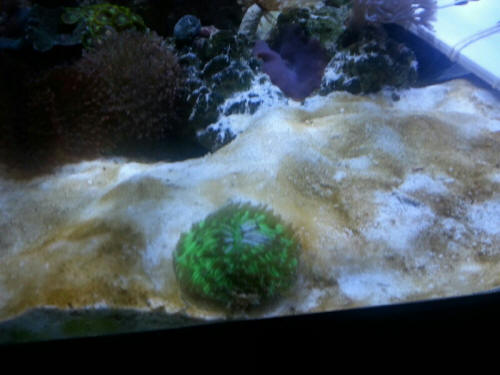 |
|
Re: Fungia Frustration 10/17/15
I took and attached a couple of pictures of my distressed bubble tip anemone.
His color is accurate, though he doesn't seem to accept food, obviously
struggling but the cause I am unsure of. Would you remove the crab? Or move the
anemone at this point? Your assistance is invaluable.
<Unless you have some other system; I would move neither. Search WWM re
Entacmaea; and READ. BobF>
|
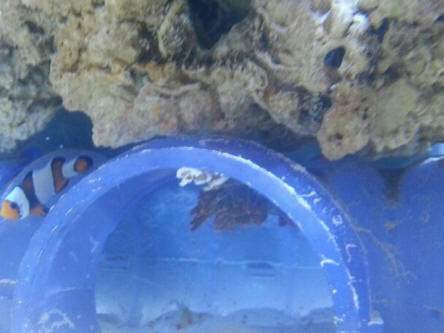 |
|
Saltwater aquarium question. Fungiid beh., hlth.
6/2/15
Hi, I'm hoping someone can give me a bit of advice on a new orange plate
coral I got last week. It just doesn't seem to be doing great
since I put it in the tank,
<Common for these species>
not swelling up and putting out tentacles like my other green one and I think it
might be losing a bit of colour, going a little duller maybe (I'm not quite sure
about that though because my vision is colour deficient so can't really tell for
sure). It also doesn't seem to have the same kind of mouth that my green one
has, just a pale bit in the middle, the green one has a very obvious mouth but
not this one. Anyway there's a picture of both so you can see what I mean. Does
it look ok?
<A little puffy, but...>
Also I moved it to a slightly shady spot with less flow because I wondered if it
was getting too much light or to much flow.
http://i215.photobucket.com/albums/cc280/fluffy_stitch_jodi/Orange%20plate%20coral.jpg
http://i215.photobucket.com/albums/cc280/fluffy_stitch_jodi/Green%20plate%20coral.jpg
Thanks,
Chris.
<Have you read on WWM re the health, keeping these animals? Administered
iodide-ate? Bob Fenner>
|
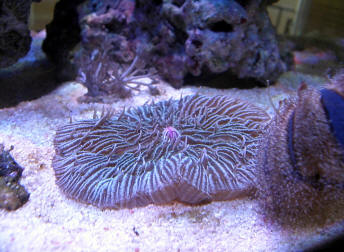
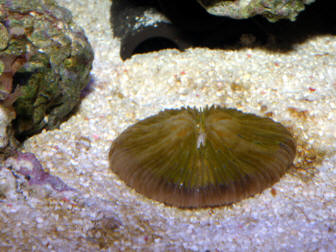 |
Orange Plate Coral Missing Mouth -- 5/3/08 Dear Masters
of The Waterverse, <Heeee!> Your website is the best with the
most information out there, keep up the awesome work.
<Trying> I am a newby to the salt realm. I used the search
and it seems like there was a case similar but his picture looked
somewhat different. I started about 7 months ago. Most of the time
it feels like I'm a glutton for punishment so here is my latest
escapade that hopefully any one there can help me out with. I have
a 30g tank, Aqua C HOT skimmer, Whisper 40 filter, Compact USA
Power Compact Lights 186 W, Hydor Koralia 2. My water parameters
are: Salinity : 1.024 Ammonia: 0 Nitrate: 0 Phosphate: 0 PH: 8.4
Temp: 80 F 30 lbs live rock Calcium 400 ppm KH/GH:10 I do 2 to 3
gallons water change per week. Although tank is 30 gallon the water
inside is 20 gallons. I started using ro/di water two weeks ago due
to algae, red slime, green slime, brown diatoms. I have hermit
crabs 4 big(1 inch) striped legged, 4 blue legged, 2 cleaner shrimp
and 1 peppermint and various snails, Cerith and Nerite. Fishwise I
don't have anything that can harm the coral. Yellow tang (I
know, but it's small), <Mmm... this tank is too small>
Clown fish, Chromis, blue neon goby. I have small frags of some
zoos, 1 Ricordea, 1 polyp of candy cane, 2 small open brain (3
inch), 1 red mushroom. About 5 days ago I bought an orange plate
about 2.5 inches diameter, I drop <A fox pass... Faux pas... you
would do well... much better to have/use a separate system for
acclimating/isolating new livestock> acclimated for over 2 hours
and dipped it in Lugol's solution according to the directions.
the first 2 says were great tentacles were out, I could see the
mouth open and shut, but on day 3 Wednesday the mouth looked
missing and I did not see any tentacles, I did see some white
filaments for a short period of time. Last night day 4 I did see
the peppermint shrimp picking at the mouth area <Bad...> ,
but did not see it do that the previous 2 days. And when I look I
look for a long time (my wife hates the fish tank) <Not good...
I'd be recruiting her> during the day and at night and did
not see anyone bother it. The coral has been placed on the sand. I
moved it closer to Hydor Koralia 2 pump so that it could get a
slightly stronger water flow. I've attached some pics so maybe
you have some advice for me? Is this normal for the coral? Should I
put it in a protective box and spot feed? <I would> Is it the
moving around causing it stress? <Yes> Is the mouth severely
retracted or gone (with open brain I can always see a mouth but
this is just a cavity)? <Just retracted> What should I do?
<Read> I don't think I have the tissue recession as the
other guy on the post but I could be wrong. The pictures are pretty
blurry (old school digital camera). If they are so horrible and
can't determine let me know and I'll get a better camera
and from someone and redo them. I would appreciate any and all
advice. Thanks. Steve Chen
<An intermediate setting Steve... Bob Fenner> |
|
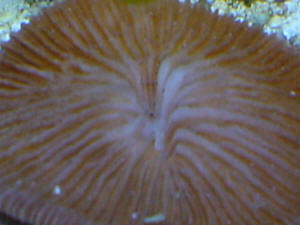
|
Withering plate coral? Heliofungia... misplaced and
period. 5/23/07 Hello. Like most questioners, I am
newer to the hobby. <Is a blast eh?> I searched this site for an
article on long tentacle plates and was unable to find one. Please help
me investigate this situation. <Hmmm, the monotypic genus
Heliofungia? Please see here: http://www.wetwebmedia.com/fungiids2.htm
and the linked files above re the care of the family, Fungiidae> My
24 gal tank <Very hard to keep this family of stony corals in such
small volumes... just too unstable chem-, phys, biolog- ically> has
been running for about 4 months right now. Ph, nitrate, nitrite, and
ammonia levels have been great all along. I have a 12 lb block of live
rock that is the home for my star polyp coral, which has been doing
fantastic. <And is an organism "high" on a scale of
"winning" allelopathically...> I have a few scarlet crabs
and some snails as well as a green Chromis that seems healthy. I
recently added a Kenya tree and a long tentacle plate coral. <This
species, H. actiniformis, is very difficult to keep...> They are
based at the bottom middle/front of the tank and are receiving plenty
of light and a steady water flow. I feed them Kent's essential
elements once a week along with some ZooPlex every couple of days. The
plate also seems to like krill. Both the Kenya tree and the long
tentacle plate were adjusting well until this week when i noticed the
tentacles on the plate are somewhat withering and shrinking. Is it
dying or is this just a process it goes through? <Is likely dying...
due to the vagaries of collection et al., the small/changeable system,
the presence of the other Classes of stinging-celled life... It would
be surprising if this organism were doing well here...> I also
noticed a bubble at the base of the plate. Could you explain this to
me, please? Elizabeth <This last may be a reproductive/bail-out/last
ditch effort mechanism at reproduction... You will read about this in
searching the above link. Please adapt/adopt a/the process of
investigating new purchases BEFORE their acquisition. Bob
Fenner>
Plate corals... hlth. 5/11/07 I have
a 155gal reef tank with a Birdsnest branching coral, xenia, polyps,
candy cane, hammer, and mushroom corals everyone of those are fine. I
bought a large plate coral it did fine for three months so I bought a
lone tentacle plate <? Is a common name am not familiar with... a
Fungia species? Heliofungia?> it did fine for about two months they both ate and
I read everything I could about them so I would care for them right and
they both at the same time started looking almost like there skin was
being cut or going away and there bones were showing they would
sometimes heal and then it got so bad they both died within a week of
one another. They were not close to and other corals and they were
about three feet from one another and none of my fish picked on them I
watched day and night were they could not see me I do water changes and
put calcium in there and have read about seven books about them. Any
idea what may have gone wrong I would love to have another one. <Not
w/ the paucity of information presented... What re set-up, maintenance,
circulation, water quality tests, foods/feeding...?> My tank has
been set up for about three years. If you could please help. Thank you.
<Please read here: http://www.wetwebmedia.com/fungiidae.htm and the linked files
above. Bob Fenner>
Fungia repanda looks ill... was "stunningly
pink"... 10/27/06 Hi guys, <And gals...>
I've had the Fungia repanda for about 2 weeks now. When I got
it, it was a stunning pink <... very likely dyed... a
suiting homonym for died...> but over the last couple of days it
has got a lot lighter in colour and now is a mixture of light
brown and white. The flesh appears to have sunk into the spiky
skeleton, which is now very obvious, and the mouth is open.
I've been feeding small pieces of lancefish once a week.
<...> The plate I placed on the sand under 216w of T5's
and with little flow around it. My calcium is 420 and Alk is
6dkh (been at this level for months!! currently using
SeaChem to try to raise it to around 8dkh). I would be
most grateful if you could shed some light on what is
happening and what I can do to restore the coral to its former
glory. <Can't be done... You've been swindled. Please
read here: http://www.wetwebmedia.com/dyedcorals.htm and the
linked files above. BobF>
Cheers
Kev, Yorkshire (UK) |
| Re: Fungia Repanda looks ill... 10/29/06 Hi Bob, <Kev> thanks for
your reply, it certainly surprised me. I've included a link
below to the site where I bought the coral and it includes a
picture of the coral when I first got it. Do you think
it has been dyed? _Purple Plate Coral :: Archived Coral
( Already Sold Items ) :: Archived Items :: Reefstore_ (
http://www.reefstore.co.uk/cart/Pu
rple-Plate-Coral-pr-17083.html) <Mmm, no... or at
least not by this photo. The flesh itself is what I had taken as
being pink... not simply the light red coloring along the edge of
the skeleton shown. This can indeed be "just natural">
A forum member suggested the plate could be suffering due to
chemical warfare. I have a group of 3 Sarcophytons about 8
inches away on a higher rock and several small Capnella
frags about 4 inches away. Could these be causing a problem?
<Oh yes... along with the fact that these and most all other
Fungiids are not easily kept in/under aquarium conditions
period> I noticed during the night a Halloween crab sat on the
plate. Could this have caused the problem? <Yikes...
Yes> Thanks again for replying. Kind Regards Kev <Welcome...
You have read re Plate Coral husbandry on WWM I take it.
BobF> |
|
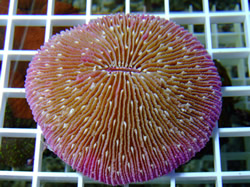
|
Heliofungia actiniformis - 01/01/2006 Hi,
<Evenin' Lloyd.> I've read through the website &
FAQs, but was hoping for a prognosis on one of my corals. Picture
is attached. <Ok.> I have had a Heliofungia plate in my tank
for about 6 weeks. For the first few weeks it was ok, then it had a
couple of incidents when it inflated like a balloon. Then it
excreted a lot of white mucus and little by little all the polyps
shriveled away until now only the mouth is left. <Any other
corals nearby?> What is weird is that the vertical coral
'fins' appear to have advanced into the center at the same
time, but maybe they are just more apparent now that all the polyps
are gone. <Yep.> Recently it looks like algae has started
growing on the fins. Is it dead? <Afraid so.> Is there
anything you can suggest to revive it? <No. They are very
capable of regeneration, but I think this one is too far gone.>
I don't really want to try this again until I have a plausible
theory for what went wrong. It is possible that the brine shrimp
type food was wrong based on what I have subsequently read.
<Yes, also much else that could've caused this.> Facts
& Figures: Approx 6 month old tank. Plate is on sand at the
bottom of a 280g tank, 26" from the surface. Lighting is
4x175W 5500 MH with PC fluorescents. Lots of light but a deep tank.
Approx 100 lbs of Fiji live rock. All the water chemistry is ok,
except nitrates showing 20ppm, and Ca is only 340ppm. Am still
researching Ca alternatives based on the advice from your website.
Thanks in advance for any suggestions you can make. I am something
of a novice at this. <Well, it seems like you're on point
with your thoughts (water quality that needs correcting, diet).
Make sure not to place these in high flow areas and away from other
corals. Other than that, just research more on this before a second
try.> Regards,
Lloyd Spencer.
<Better luck next time. - Josh> |
|
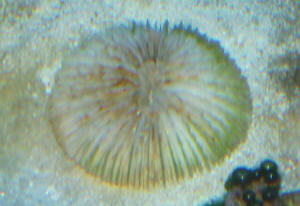
|
Fungiid problems - 2/24/03 I have had this plate
coral for a few weeks now. the tentacles only come out at night and I
keep getting a stringy discharge <Could be Zooxanthellae bailout
(bleaching event) or just passed food stuffs> all over the top here
lately. also my main concern the edges are pink and they are turning
white are clear on the edges is there something wrong or something I
should be doing? <Check here: http://www.wetwebmedia.com/fungiidfaqs.htm
and here: http://www.wetwebmedia.com/fungiidae.htm
Be sure to feed this coral Mysis shrimp and krill (frozen is fine) when
there is polyp extension, and place this coral on the substrate. The
feeding may help the potential bleaching that is occurring (the pink
edges turning white)>water tests are fine. <OK> also I would
kill for a good book if you know of any... <No need to kill. Know of
a great many books...... I personally really enjoy and found most
informative, Anthony Calfo's "Book on Coral Propagation Vol.
1" (which is why I am here) and I really enjoy Eric
Borneman's' "Aquarium Corals". They can be found
locally as well as online in many places. Another source of good
information is to check reef boards as often as possible as
well....much information to process there. Check the links above, leave
the coral in the substrate and feed often. Water changes are in order
here as well, in my experience. Good luck! Paul> Thanks
Carlos
|
|

